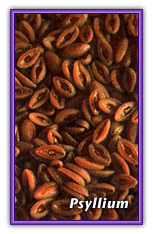 Source
Source
Psyllium seeds and husks come from three annual species of plantain, a plant group familiar to most as lawn weeds. Blonde psyllium, P. ovata, native to the Mediterranean, North Africa, and western Asia, is widely grown in India and Pakistan; black psyllium (P. psyllium, and P. indica, both known as P. arenaria) is native to the Mediterranean region and is commercially grown in Spain and southern France.
Traditional Use
The seeds and fruit husks of psyllium have long been used as bulk laxatives in Europe and the United States.
Current Status
Many consumers may already have psyllium seed products on the shelf as they are a common ingredient in bulk laxatives. The seeds and seed husks contain 10-30 percent mucilage and, when soaked in water, their volume increases greatly, swelling the amount of intestinal matter. This stimulates and lubricates the bowels, encouraging the movement of wastes through the colon. Psyllium seed products are widely prescribed and are also available as nonprescription drugs for the treatment of chronic constipation or to soften the stool to relieve hemorrhoids and related conditions.
In Germany the seeds and husks are also allowed in the supportive treatment of irritable bowel syndrome. Studies have also shown that psyllium produces a modest but significant reduction in cholesterol levels.
Preparations
Dried psyllium seeds and husks are available in the American market, in addition to their presence in many laxative products available at pharmacies.
Cautions
According to German health authorities, psyllium seed and husks are known to produce rare allergic reactions and can be dangerous in cases of intestinal obstruction. Because some psyllium preparations contain sugar, diabetics should use them only under a physician's supervision.
Symptoms
Constipation
Actions
Laxative
Lowers cholesterol

![]()
![]()
![]()
 Source
Source